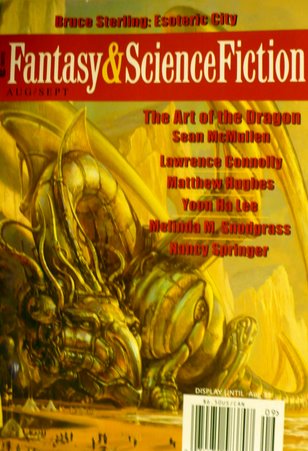to its advent–for example, here and here–a book long merely dream or rumor is becoming printed fact:
“Then English and French and mere Spanish will disappear from the globe. The world will be Tlön.” ~ J.L.B.
to its advent–for example, here and here–a book long merely dream or rumor is becoming printed fact:
“Then English and French and mere Spanish will disappear from the globe. The world will be Tlön.” ~ J.L.B.
Before any more time goes by—yikes, it’s been a week already!—some afterthoughts on WFC. The blogosphere, ADD as it is, has long ago up and moved on, and everyone else has filed their reports and coverage. So please indulge me three quick posts pertaining thereto. First, huge congrats to all this year’s nominees and winners at World Fantasy Con!
Another round of applause from this section for my former teacher Jeffrey Ford, and the publishers of my upcoming translation of Georges-Olivier Châteaureynaud’s stories, Kelly Link & Gavin J. Grant. And w00t for the Paper Cities upset!

The latest incarnation of the annual Two Lines anthology from the Center for the Art of Translation is now out, available from Amazon and the Center itself. The cover is a marvel to behold. Inside, the book features the work of such poets and writers as Günter Grass, Adonis, Jose Manuel Prieto, George Szirtes, and Yoko Tawada, and such translators as Breon Mitchell, Esther Allen, Susan Bernofsky, Alison Anderson, and Karen Emmerich. The guest editors are the illustrious Margaret Jull Costa and Marilyn Hacker. It also includes a nifty two-pager by the incredible French comics artist François Ayroles, translated by yours truly. Because Chad Post is Chad Post, he already has a review up at Three Percent.
I would be remiss not adding that this lovely cover, which has caused acquaintances to fondle the book covetously, was the brainchild and handiwork of editor Annie Janusch, who does double world lit duty as the Works-In-Translation editor of The Quarterly Conversation. She’s been my point person at CAT for the last two years, and made the experience of contributing to Two Lines pleasurable and professional. Wouldn’t have happened without her. Three cheers!
This handsome volume fêtes its official launch on the following occasion (wish I could be there):
Monday, November 9: Book Release Party at LIMN Gallery Read the rest of this entry »
Two new pieces up in the Words Without Borders “Foreign Correspondents” issue this month, one by Gébé and the other by François Vallejo. Gébé, a satirist after my own heart, looks into the mysterious activities of the International Bureau for Front Location, while Vallejo chronicles the 1988 fire that consumed the Chiado district of Lisbon.
Editorial cartoonist Gébé’s piece, featuring a short introduction by yours truly, is taken from his prose collection Not-Quite-Botched Dispatches (But a Hard Sell for the Nightly News), originally Reportages pas vraiment ratés mais difficile à vendre à France Soir, reprinted in 2001 by Le Diléttante (that last link for readers of French).
The excerpt by François Vallejo is the opening to his 2008 novel The Burning of the Chiado (L’Incendie du Chiado) from Éditions Viviane Hamy.
Check’em out!
I’m a month late in mentioning the 8th annual Imaginales “Festival of Imaginary Worlds” in Épinal (best known for a printmaker that’s sort of the Currier & Ives of France), but luckily enough this year has seen an explosion of a English language blog coverage: Hal Duncan, Cheryl Morgan, and David Anthony Durham especially provide detailed accounts and fun photos. (The con site itself has an English version that, where tourism sites are concerned, only slightly smacks of wonky Anglicization. Monsieur gets to say that ‘coz he’s a snobby translator très littéraire.)
Among the stories nominated for the Prix Imaginales in the Best Short Fiction category were Kelly Link’s “Stone Animals” and two nouvelles by Lionel Davoust. One of these, “L’Île close,” a meta-Arthurian fantasia, took home the prize–CONGRATULATIONS–and will be appearing (translated by yours truly, with wonderful advice from editor Delia Sherman and all this despite the author’s fluency in English) in the Interstitial Arts Foundation’s fall anthology Interfictions 2. Ah yes, this post had you fooled at first, but it is in fact a shill. By hook or by crook, I always end up pushing a book. Which leads us to this shout-out from the IAF:
 We live in a world of niche marketing. The Interstitial Arts Foundation brings artists together to tear those barriers down.
We live in a world of niche marketing. The Interstitial Arts Foundation brings artists together to tear those barriers down.
We are asking you now to join us in our next adventure in storming the barricades: Interfictions 2: a New Anthology of Interstitial Writing, edited by Delia Sherman & Christopher Barzak. Interfictions 2 will be published in November 2009 in collaboration with Small Beer Press.
The first volume of Interfictions, published in 2007, was hailed as “A phenomenal collection…engrossing and provocative” (Hipster Bookclub) that “belongs on the nightstand of anyone interested in the development of contemporary short fiction” (Atlanta Journal-Constitution).
This second volume features original work by a whole new set of writers who joyfully explore the big imaginative spaces between conventional genres. And this time, we’ll be reaching out to even more readers by publishing a series of free stories on the new Interfictions 2 Annex online!
What can you do to help? This extraordinary collection of interstital fiction needs your financial support. We’re asking you to sponsor not just a book, but an idea – the idea that artists need to be able to express themselves freely and directly to their audiences, without the restraints of conventional genre limitations.
Here are some ways you can help us publish Interfictions 2: Read the rest of this entry »
Recently, translating a pay piece I didn’t pick, I had what seemed like some new thoughts on an old translator’s conundrum: to alter or not to alter. I tend to take fewer liberties with pieces I don’t pick, because the voice may not speak to me; it’s a glove I don more gingerly. Strange, that interpret should have two meanings and translate only one, and that one imply a one-to-one mapping, as in, “That doesn’t translate.” The professional sense of the terms are still widely confused, and most people (who, on learning what I do for a living, ask “Oh! Have you tried working for the UN?”) still use them interchangeably, but the distinction seems obvious once drawn—translators write (ghostwrite) and interpreters speak (are ventriloquized); both channel, paraphrase, yet I found myself tempted to tell an editor who asked for sentences somewhat freighted and opaque in an original to be further elucidated, “My job is to translate, not interpret the text.” That is, although the act of translation is one of comprehension, of explaining a text to oneself (indeed, as all reading is the rescuing, mining, or recovery of meaning from a text into one’s own private unarticulated language; to that translation adds periphrasis in a communal tongue) it seems the final translation should not go further in the direction of explication than allowed for in the original. Read the rest of this entry »
“Être aimé n’entraînait aucun devoir et donnait tous les droits, aimer ne conférait que le droit de souffrir.” ~ Georges-Olivier Châteaureynaud, L’Autre rive
“Aimer sans retour, c’est admettre qu’on se jettera dans le feu pour quelqu’un si l’occasion s’en présente, et que ce sacrifice nous vaudra trois secondes de reconnaissance, suivies d’un oubli pur et simple. Si béjaune qu’on soit, on comprend que l’autre s’accommode fort bien de nos tourments et que la vie lui demeure douce même quand elle nous devient insupportable.” ~ Georges-Olivier Châteaureynaud, Le Château de verre
“Quand on est aimé, on ne doute de rien, quand on aime, on doute de tout.” ~ Colette

Review issues of the July-August Fantasy & Science Fiction have gone out to bloggers; I’ve just gotten my comps. My thanks to editor Gordon Van Gelder for all his support and enthusiasm for Georges-Olivier Châteaureynaud’s story, “Icarus Saved from the Skies.” He’s opened a thread for comments on the issue here. The latest from him:
Now’s a good time to let your readers know the issue is out—copies should be on the newsstands, while subscribers who sign up for a year of F&SF will still start off with this issue. (If you’re going to encourage people to subscribe, tell them to put a message in their order that you sent them. I’ll give a cookie of some sort to anyone who persuades ten people to subscribe.)
Bloggers are already chiming in! Caren “spitkitten” Gussoff singles out in her review “a translation of a short piece… whose ending has all the punch of a tickle but bowls over in its restraint,” while Aaron M. Wilson at The Soulless Machine Review devotes a post discussing the inevitable Marvel mutant associations the story takes on in an American context, calling it “a train wreck of emotions that sends the winged-narrator over the side of a cliff. Don’t miss it.” Many thanks for the kind words!
The shift in cultural context brings with it an interesting, almost temporal shift in terms of dating subject matter. The notion of the person with powers who just wants to be normal is probably, because of comics, way more played out here than in France, but being normal doesn’t quite carry the same weight in a less markedly conformist society, where the choice is less either/or, the dichotomy between normal and not less damningly clear-cut. The normal lives Americans yearn for often involve some idealized happiness, itemized down to the last possession by our pursuit thereof—Superman’s corn-fed family fantasies, for instance. Many Châteaureynaud protagonists tend to want to be normal in a more retiring, passive, even self-effacing way; love and happiness don’t have to enter into it. His heroes and narrators are usually marginal, outcast dreamers and luckless, well-meaning Everymen. Read the rest of this entry »
…it was no longer gentle Aribert who spoke, but a solemn and impassioned lover:
—Where do you live?
—A place underground where the light speaks.
—What do you see?
—The sockets of my eyes.
—What can I give you?
—The silence of your lips.
—My thoughts never leave you. Can this be what they call love?
—Love feeds on gazes, on kisses, and my body has left me.
—Will that keep me from loving you?
—Love asks no permission.
—Say something to me, just a word.
—Sword.
—What am I, a simple girl, to make of one?
—The most violent of offerings.
—What can I offer, if not myself?
—What is beyond you.
—And what is in me?
—Death has already taken hold of that. Give me your shadow.
—I’m trembling.
—I will marry your shadow.
—Will I ever see you someday?
—When the secret becomes a pearl.
—I feel like crying.
—Your tears, your tears in my voice…
—Must I always wait?
—Your tears in my eyes, and you will blossom.
—Never in this world?
—Always in this world.
—Mélitta.
—Conradin.
from “Terre de songes” by Marcel Schneider, in the collection Histoires à mourir debout.
A beautiful bit of dialogue I just had to translate. Ideally I’d like all my dialogue to slip logic’s shackles so poetically, almost accidentally, a dream catechism, each speaker responding to the other like a lost soul to the echo of stone struck on stone in the distant chambers of a cave: for who, making his or her way alone from the labyrinth, is not led on by such a sound? Read the rest of this entry »

by Dr. Frédéric Saldmann